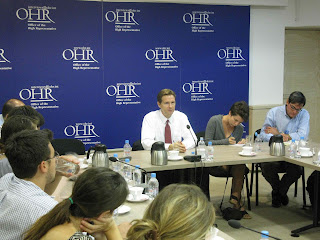Military Dictatorship in Egypt - now fully in place
What is determining
Egypt's future is not happening at the polls.
- Sherine Tadros, Al-Jazeera
[SCAF’s] new
constitutional declaration completed Egypt’s
official transformation into a military dictatorship.
- Hossam Bahgat,
Egyptian Initiative for Personal Rights
Egyptians were depressed leading up to this weekend’s
presidential elections – from business men to college students to waiters and
taxi drivers, people I’ve met all week keep using this word: “depressed.” It reflects the horrible political
situation, and it reflects the dismal, “depressed” economic situation. And for all of them, personally, it reflects their
moods. And so, there was zero
enthusiasm for either of the two choices Egyptians were facing at the polls on
Saturday and Sunday: the Muslim Brotherhood leader Mohammad Mursi and the
regime’s candidate Ahmad Shafiq.
There is nothing to boost Egyptians' spirits now that the results
are coming in. No matter who is
declared the “winner”, the military will remain in near-full control of the
political, security, judicial, and budgetary levers of power for some time to
come.
SCAF – the Supreme Council of the Armed Forces – has been directing
events since February 11, 2011 (when Hosni Mubarak stepped down). They’ve sent superficially correct
signals to the world and to Egyptians that they would be stepping away from
power on July 1, 2012, once a President was elected. But events of the past week, on top of other actions over
the past year, belie any of their claims to allow a democracy to develop in
Egypt.
JUNE 13: Egypt's justice ministry issued a decree allowing
military police and intelligence officers to arrest civilians suspected of
crimes. This decree restores some
of the powers of the infamous emergency law, which human rights and other
activists fought for decades to end and which SCAF abandoned on May 31.
JUNE 14: Egypt’s Supreme Constitutional Court declares that 1/3rd
of the Parliament was disqualified, and therefore the entire Parliament was to
be dissolved. SCAF announces that
it will assume all legislative powers, on top of all executive (“presidential”)
powers it has held since February 11, 2011. SCAF also announces that it will form a new 100-member
constituent assembly, to write the new Constitution.
JUNE 17: Within minutes of the polls closing on the final day of
presidential elections, SCAF issued a new “constitutional declaration”
(amending its March 2011 “constitutional decree”) severely curtailing
presidential powers and dictating its own near-total autonomy in military
affairs.
JUNE 18: civil advisors to SCAF are saying that the newly elected
president is an “interim” president and that he will not last a full term; and,
that new elections for president will come again (within a year?), after the
constitution is agreed.
With these combined judicial and military declarations, the
transition to military dictatorship is “complete” (as Hossam Bahgat
decries). A new president,
especially a Muslim Brotherhood leader, will have no authority over the
military. Nor will any future
Parliament. Most notably, the
President is no longer to be considered the “Commander in Chief”; that role is
assumed by the head of SCAF, which will continue to function as a body even
after the current SCAF, headed by Field Marshal Hussein Tantawi, recedes into
the background. Now we know that
this “background” is not what people assumed would happen – SCAF will continue
in its “supremely” powerful control over military and security matters,
including all budgetary decisions around the military forces.
Any hope for a democratic Egypt, with checks and balances
between and among the traditional bodies of a democracy: executive,
legislative, and judicial branches, is now altered radically. An old institution – the military –
will now have a radically enhanced role, fundamentally upsetting the
traditional balancing powers.



Comments
Post a Comment